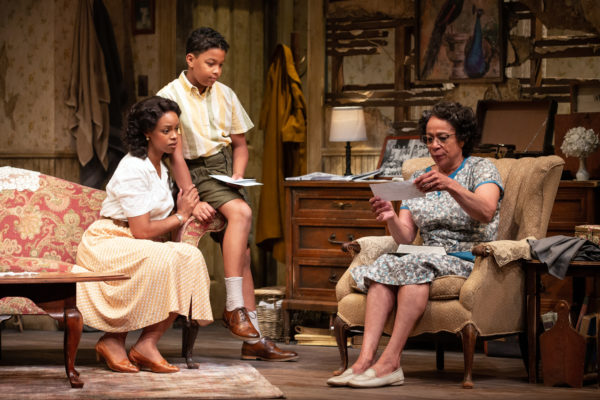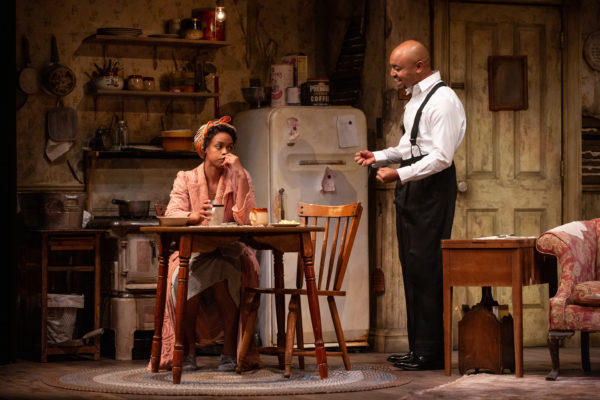Theater Review: “A Raisin in the Sun” — A Great Evening of Theater
By Helen Epstein
To see Raisin in the Sun in post-Obama America is to experience how a classic both remains emblematic of its time and changes resonance as time passes.
A Raisin in the Sun by Lorraine Hansberry. Directed by Robert O’Hara. Staged by the Williamstown Theater Festival on its Main Stage, Williamstown, MA, through July 13.

Mandi-Masden, Owen-Tabaka, and S. Epatha Merkerson in the Williamstown Theatre Festival production of “A Raisin in the Sun.” Photo: Jeremy Daniel.
I’ll start with a rave: Brilliantly cast, superbly directed, this production of Lorraine Hansberry’s 60-year-old play is one of the most powerful pieces of theater I’ve seen at the Williamstown Theatre Festival in the past decade. A Raisin in the Sun is unquestionably an American classic: poetic, perfectly structured, with unforgettable characters. Had Hansberry not died in 1965 at the age of 34, she might have produced as extensive a body of work and become as well-known around the globe as Arthur Miller. To see Raisin in post-Obama America is to experience how a classic both remains emblematic of its time and changes resonance as time passes.
The play’s title comes from Harlem, a poem by Langston Hughes:
What happens to a dream deferred?
Does it dry up
like a raisin in the sun?
Or fester like a sore—
And then run?
Does it stink like rotten meat?
Or crust and sugar over—
like a syrupy sweet?
Maybe it just sags
like a heavy load.
Or does it explode?
In Robert O’Hara’s tautly-strung production, the dream deferred is always on the verge of exploding. The tension of everyday life (and this two and a half hour production) does not let up for a minute. It corrodes the relationships between the play’s central characters: Lena Younger, the widowed matriarch, grounded in her religious faith; her children Walter Lee, a bitter, sporadically hopeful, chauffeur and Beneatha, a proto-feminist college student; Ruth, Walter’s compliant wife and Travis, Walter and Ruth’s bubbly 10-year-old son. The dream deferred also festers like a sore beneath the Youngers’ relations with the other characters: Beneatha’s two suitors (a rich American Negro and a Nigerian intellectual, each sexist in his own way); their nosy neighbor Mrs. Johnson; and Walter Lee’s trifling sidekick Bobo. No relationship is left unscathed by betrayal of one kind or another.
The Youngers and Mrs. Johnson’s family share a hall bathroom off the purposely shallow set, which evokes a cramped apartment on the South Side of Chicago in the 1950s (masterfully designed by Clint Ramos to the last detail, including the crucifix over the front door). As the play opens early one morning, Travis is asleep on the living room sofa while his mother Ruth gets breakfast going before waking him up for school. Then the rest of the family lines up to use the bathroom.
If you’ve read Michelle Obama’s memoir (Arts Fuse review) of growing up in a similar apartment one decade later, you are familiar with the historical background that Hansberry sketches in. The fictional Youngers, like the real-life Robinsons, are descendants of blacks who moved north to Chicago in search of jobs, only to find employers who preferred to hire whites. They dream of their children attending college and buying a house with a backyard, but it’s hard to save up money while paying monthly rent. If they manage to accumulate the money, moving to the suburbs means braving the violence of prejudiced whites.
As Raisin opens, some of the dream seems possible. Walter Younger Sr. has died prematurely, leaving his wife an insurance policy worth $10,000. Lena wants to use it as a down payment on a house; Walter Lee wants to invest in a liquor store, whose profits will make the family rich; Beneatha wants part of it to finance her medical school tuition.
Some of the conflict over how to spend the inheritance is generational. Mrs. Younger tells her son that, in her time, people worried about not being lynched. “Once upon a time freedom used to be life—now it’s money. I guess the world really do change .” He replies, “No—it was always money, Mama. We just didn’t know about it.” In a lyrical monologue that made me think of the memorable “My Boy Bill” from the musical Carousel, Walter Lee tells Travis, “You wouldn’t understand yet, son, but your daddy’s gonna make a a business transaction that’s going to change our lives. . . . That’s how come one day I’ll pull the car up on the driveway . . . the gardener will be clipping away at the hedges and he’ll say, ‘Good evening, Mr. Younger.’ And I’ll say, ‘Hello, Jefferson, how are you this evening?’ And I’ll go inside and Ruth will come downstairs and meet me at the door and we’ll kiss each other and she’ll take my arm and we’ll go up to your room to see you sitting on the floor with the catalogues of all the great schools in America around you. . . . All the great schools in the world! And—and I’ll say, all right son—it’s your seventeenth birthday, what is it you’ve decided? Whatever you want to be—Yessir!”
Francois Battiste, an actor of extraordinary range, delivers this monologue with a tenderness that makes Walter Lee’s later, rage-filled (and more famous) monologue seem all the more brutal. His nuanced performance is great fun to watch, whether he’s being a drunk and/or sullen son, elegant as a cat dancing with his wife, strategizing his liquor business deal, or telling off the white emissary from the Clybourne Park Improvement Association who would like to bribe the Youngers to not move into their segregated suburb.

Mandi Masden and Francois Battiste in the Williamstown Theatre Festival production of “A Raisin in the Sun.” Photo: Jeremy Daniel.
The agile, graceful Battiste is perfectly balanced with the stoic, devout, immovable force of Lena Younger, played by S. Epatha Merkerson, the veteran actor who has a huge fan base for her work over 15 years as Lieutenant Anita Van Buren of the TV series Law & Order. Ms. Merkerson is as subtle as Battiste, but within a deliberately smaller emotional range, which makes her every gesture and facial expression all the more riveting.
Director Robert O’Hara has made all the relationships among his characters equally tense and multi-faceted in this production. Rather than focusing on the stand-off between mother and son, he focuses on a number of the themes Hansberry addresses in her script, particularly power relationships between men and women; the marginalization of homosexuality; the emerging awareness of women’s rights including the availability of (illegal) abortion; the appeal and mystique of emerging African nations for American Negroes in the 1950s.
O’Hara made some surprising casting and directing choices. Nikiya Mathis as the independent aspiring 20-year-old college student Beneatha (closest to the playwright herself) is almost all spunk and no nuance. There’s little reflection here as the actress plays the role as though she were the teenage older sister of her nephew Travis — not a serious, searching student. On the other hand, the graceful Mandi Masden is cast as Walter Lee’s wife, providing a fine portrait of a beautiful, quiet, seemingly fragile woman who effectively runs the household and manages to smooth over conflicts between mother and son, and the two siblings. In a cast of virtuoso personalities who relish singing their own arias, Masden serves as a steady, soothing obbligato. The costumes by Alice Tavener and sound design by Elisheba Ittoop are both pleasing and effective as is the lighting by Alex Jainchill.
Owen Tabaka as Travis is adorable and steals every scene he’s in. As Beneatha’s two suitors, Joshue Echebiri is a persuasive Nigerian intellectual; Kyle Beltran is convincing as the rich and obnoxious George Murchison.
Critics have made much of O’Hara’s own work as a playwright (Barbecue, Bootycandy, and The Etiquette of Vigilance, which extends Raisin to Travis’ maturity) along with his jettisoning of Hansberry’s stage directions. His most obvious directorial innovations are the introduction of an additional character (Walter Sr’s ghost), which I found superfluous, and staging Walter Lee’s second monologue as a confrontation with the audience, instead of his mother, which I thought shocking and powerful. The director has also added a visual postscript, in which we see the community’s response to the Youngers’s moving into their new home in Clybourne Park, which I found apt.
But these are squibbles. The production as a whole is an example of what a great evening of theater should be. I only wish it could be available to millions of people, not only to the wealthier residents of, and visitors to, the Berkshires during its all-too-brief run. HBO, Netflix, do it!
Helen Epstein is the author of Joe Papp: An American Life and nine other books of non-fiction. She has been reviewing for The Arts Fuse since its inception.
